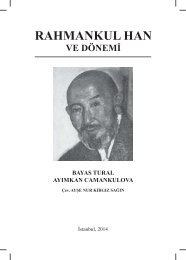THE SOVIET HISTORIOGRAPHY AND THE QUESTION OF KAZAKHSTAN’S HISTORY
SOVYET-TARIH-YAZICILIGI-ENG
SOVYET-TARIH-YAZICILIGI-ENG
You also want an ePaper? Increase the reach of your titles
YUMPU automatically turns print PDFs into web optimized ePapers that Google loves.
168<br />
<strong>THE</strong> <strong>SOVIET</strong> <strong>HISTORIOGRAPHY</strong> <strong>AND</strong><br />
shennosekretno), historians could acquire and use them. Otherwise,<br />
these confidential and very confidential documents could be used by<br />
special researchers, and only with permission, which could only be<br />
taken from special government institutions.<br />
Any quotes taken from the documents were ascribed to numbered pages<br />
and checked by special personnel at the archive. The quotes not related<br />
to the written subject information, were removed or lined through. 293<br />
Archives of the Soviet Union were centralized in Moscow and Leningrad,<br />
and this situation was a handicap for the historians who lived<br />
or worked in elsewhere. This problem was stated by scholars from<br />
time to time. The KGB archives were out of bounds during the Soviet<br />
Period, for anyone who wanted to search about the recent past. But it<br />
can be seen that during the last days of the Soviet Union, historians<br />
used those archives. 294<br />
It is necessary to mention the publication of documents that were<br />
available for historians to use during the Soviet period., which require<br />
substantial work and effort. To be more specific, it was seen as a<br />
substantial team-work<br />
The editorial work by scholars was not enough, it also required some<br />
party members too. This party member was assigned by the party ideology<br />
department, was not only responsible for reading and evaluating<br />
the comments of these scientists about the documents and works, but<br />
they also had the “power of intervention” to the content of the documents.<br />
Rearranging the document contents according to party ideology<br />
was an important consideration. Therefore, this practice should always<br />
be noted while evaluating the Soviet period documents and archives.. 295<br />
Thus, the Soviet historian had to utilize only the documents made<br />
available to him.<br />
5. Importance of the quotations that historians use or made<br />
The points to be considered during the writing process were:<br />
Quotations from Soviet leaders representing Soviet ideology at the<br />
beginning of the document. This meant especially quotes from Marx,<br />
293 Ağayev, ibid, p. 151.<br />
294 Some of the middle asian historions tod their complaints about this matter in Moscow<br />
like this: “Some of the documents about the Middle Asia are located in Moscow. This situation<br />
gives local historions a hard time.” See: Все союзное совещaние о мерaх улучwения<br />
подготовки нaучно-педaгогических кaдров по историческим нaукaм,Москвa, 18-21<br />
дек. 1962 г., Moscow, 1964. p. 241.<br />
295 The process of publishment of A.İ Gertsen’s Works is a right example to give about this<br />
subject. During this process lots of ideas and sentences took out of the work by party officers<br />
because they were not suitale to the party ideology. For detailed information look<br />
Tvardovskaya, p. 195-196



